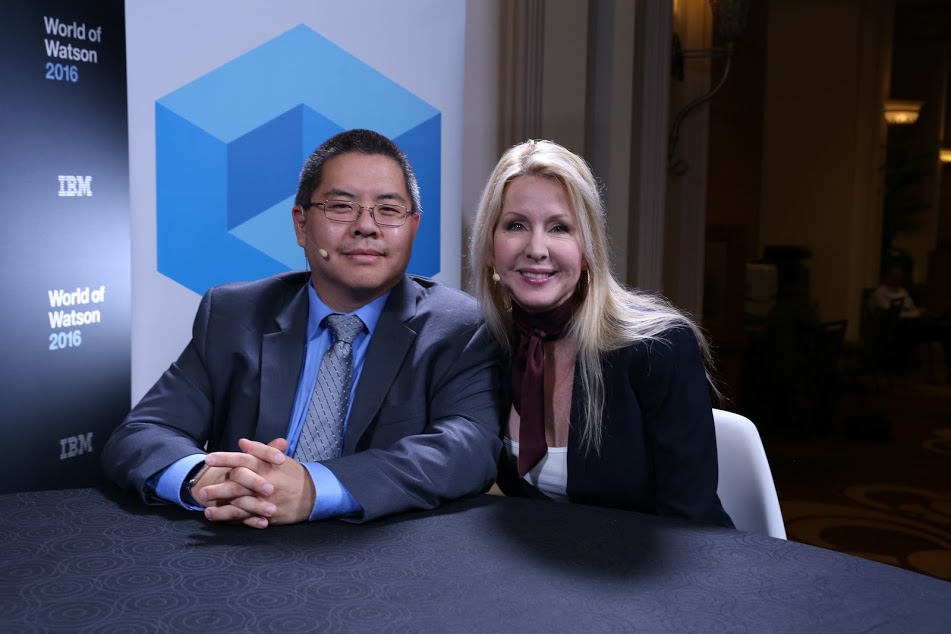 NEWS
NEWS
 NEWS
NEWS
 NEWS
NEWS
IBM Corp. frequently collaborates with innovative third-party influencers to share its story. The IBM Social Influencer Program aligns perfectly with IBM’s Heart of Business Tour, bringing together business leaders, business partners, innovators and thought leaders to connect and succeed, together.
Two of these top influencers — Chris Penn, VP of Marketing Technology at SHIFT Communications, and Tamara McCleary, CEO at Thulium.co — joined John Furrier (@furrier) and Dave Vellante (@dvellante), co-hosts of theCUBE*, from the SiliconANGLE Media team, during IBM World of Watson to discuss Watson’s latest capabilities and what that can mean for the future of work.
Furrier asked the guests what they’d seen during World of Watson, what new information they were finding out this year and what topics are on their minds, as influencers.
Penn said that they are seeing a five-part structure: companies that are data-unaware; data-aware; data-curious; data-guided; and, eventually, data-driven. “What’s happening at IBM World of Watson … data-aware and data-curious companies are being ‘express-elevatored’ up,” he explained. “So we’re seeing that evolution happening with analytics. But what we’re also seeing is that IBM is making it easier for companies to manage their data, clean it, scrub it, have it delivered to your desk, and ready to go. It’s beyond code, beyond developers; it’s now out to the business users.”
McCleary added, “I think we’re seeing [this year is] a lot of practical applications, rather than just talking about cognitive analytics.”
When asked for some use case studies for Watson, McCleary replied, “The partnership between Watson and Thomas Jefferson University Hospitals, it goes beyond [successfully diagnosing] cancer patients. What’s really cool is, Watson is taking a very human component, and being in the patient’s room, and the patient can ask about visiting hours, or what time is lunch served. What Watson can bring, a chat bot to the patient’s room, it’s very exciting.”
The guests and the hosts discussed how Watson can augment, not replace, existing doctors or nurses from standard questions, freeing them up to administer more complex tasks.
Given all of the tasks that Watson can perform, Vellante asked, “What can humans do that machines can’t?”
“Creativity,” said Penn. “We still need to relate to each other. In the writings of Fredrick Engels, a lot of the ideas of original socialism was to allow machines to take over routine tasks to leave humans to think up more creative ideas.”
Penn added, “Connecting with Watson analytics … it expands the capabilities of people to make better decisions.”
Watch the complete video interview below, and be sure to check out more of SiliconANGLE and theCUBE’s coverage of IBM World of Watson 2016.
*Disclosure: IBM and other companies sponsor some IBM World of Watson segments on SiliconANGLE Media’s theCUBE. Neither IBM nor other sponsors have editorial control over content on theCUBE or SiliconANGLE.
Support our open free content by sharing and engaging with our content and community.
Where Technology Leaders Connect, Share Intelligence & Create Opportunities
SiliconANGLE Media is a recognized leader in digital media innovation serving innovative audiences and brands, bringing together cutting-edge technology, influential content, strategic insights and real-time audience engagement. As the parent company of SiliconANGLE, theCUBE Network, theCUBE Research, CUBE365, theCUBE AI and theCUBE SuperStudios — such as those established in Silicon Valley and the New York Stock Exchange (NYSE) — SiliconANGLE Media operates at the intersection of media, technology, and AI. .
Founded by tech visionaries John Furrier and Dave Vellante, SiliconANGLE Media has built a powerful ecosystem of industry-leading digital media brands, with a reach of 15+ million elite tech professionals. The company’s new, proprietary theCUBE AI Video cloud is breaking ground in audience interaction, leveraging theCUBEai.com neural network to help technology companies make data-driven decisions and stay at the forefront of industry conversations.